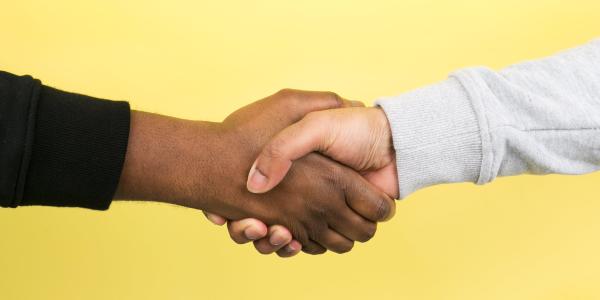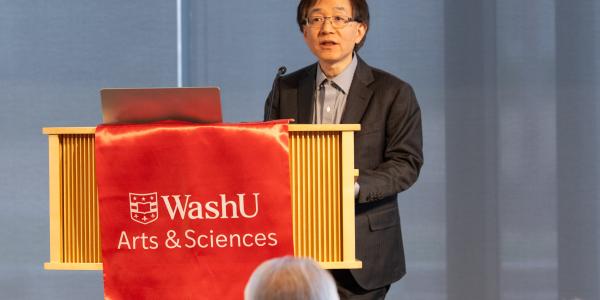In her book No More Invisible Man: Race and Gender in Men’s Work, sociologist Adia Harvey Wingfield documents the pervasive and often subtle ways that successful black men – people like doctors, lawyers, and engineers – continue to face inequality in the workplace. Here she shares some of these men’s stories and discusses the causes of professional inequality. In addition to teaching sociology at Washington University in St. Louis, Wingfield is a regular contributor to The Atlantic.
Transcript:
Claire Navarro (host): Thanks for listening to Hold that Thought. I’m Claire Navarro. Today we’re kicking off a series of episodes about inequality in the United States. Over the next several weeks, faculty here at Washington University in St. Louis will share their research on the history of inequality, where and how it exists today, and what we can do about it going forward. Our first guest is Adia Harvey Wingfield, a professor of sociology and a regular contributor to The Atlantic. Wingfield studies the intersection of race, class, and gender in the workplace – places like corporate offices, hospitals, and law firms. We’ll hear some of her findings today. As for her own professional track, Wingfield’s interest in both sociology and inequality got an early start.
Adia Harvey Wingfield (guest): I think I first decided I wanted to be a sociology professor when I was a high school student. I took a high school class with Mrs. Ellington, which was a sociology class, and it blew me away. I found it really interesting, really exciting, very informative.
CN: Years later, in graduate school, she had a similar light-bulb moment when taking a seminar on women in the workplace. From then on, much of her research has been about the experiences of minority workers. According to Wingfield, a lot of the existing research in this area focuses on a group she calls the urban underclass – people who are unemployed or underemployed. That kind of work is really important, she says, but it’s also only part of the story.
AHV: It seemed to me in doing a lot of my work on black professionals that we were really missing an integral and important group by not focusing on black men who were in that professional category.
CN: Men like lawyers, doctors, engineers, bankers. It’s easy to assume that people in these kinds of high-profile jobs don’t need to be studied because they’re the success stories. They don’t face inequality; they’ve already overcome it.
AHV: Unfortunately what we know from a lot of sociological research, not only mine but many others, is that that's not actually true. There are still ways that processes of racial discrimination and inequality and other things serve to put black professionals in a position that isn't necessarily equal to their white coworkers.
CN: Wingfield documented these experiences in her book No More Invisible Man: Race and Gender in Men’s Work. For the book, she conducted in-depth interviews with African-American professional men. Through the conversations she found that even in high-status positions, black men do still confront unequal treatment at work. Doctors had some of the most dramatic stories to tell.
AHV: They often cited some of the most overt examples of racial stereotyping that had an impact on their ability to do their jobs. Questions from patients or doubts from patients, in particular, who don't see them as being qualified or suitable or capable for delivering health care.
CN: Emergency room doctors, in particular, had to deal with this kind of treatment. But what about professionals who don’t deal directly with the public, like lawyers and engineers? Wingfield learned that unfortunately, these workers also face inequality at work. But – and this is important – their experiences were different, and often more subtle, than the overt racism described by the doctors.
AHV: So it's not that these workers are coming to work and people are, for the most part, mistreating them openly, or obviously excluding them, or calling them names, or anything like that.
CN: In fact, these black professionals described being treated well at work and having good relationships with their white colleagues. But, that doesn’t mean that they experienced total equality. For example, when describing what it takes to be a successful black lawyer, one man coined the term “super brother.”
AHV: This particular respondent was an attorney, and he talked about how at his particular firm there were a lot of white peers who had gone to average ranked law schools, or ones that were not particularly highly ranked, or ones that were fine, but they weren't nationally known or considered to be very prestigious. But he said that when he thought about the men that he knew who were at firms that were comparable with his, they all had Ivy League degrees, very exceptional resumes, very strong standout backgrounds. The expectation was that for black professional men, the bar actually was a lot higher than it was, or they saw the bar to be a lot higher than it was, for their counterparts.
CN: And then, even with these kinds of top-of-the-line credentials, men that Wingfield spoke with felt like in some ways, they still were a step behind. A lot of professional success is based on social networks, knowing the right people to get the job or make the sale. Black professionals found that their white colleagues often had more access to these kinds of networks.
AHV: A lot of lawyers talked about this specifically. When you advance to the partnership track, or when you advance to the status of being partner in a firm, part of the expectation is that you bring in additional business. One respondent talked a lot about how he had another partner in the firm who had grown up with someone who was general counsel for a major corporation. So it was relatively easy to bring that corporation into the firm and to add that to his book of business. But he talked about how from his own circumstances growing up - and he grew up in a relatively comfortable middle-class environment, but not one where his next-door neighbor was general counsel for a major corporation - that that actually put him at more of a disadvantage, of not being plugged into those structural networks that can actively facilitate people's advancement.
CN: If this was true for someone who grew up comfortably middle class, think about all the people who don’t have that kind of support. When Wingfield asked professionals about how their race impacts their work, they often spoke about big structural problems that limit opportunities for African Americans overall.
AHV: They're much more likely to situate that in a broader context, of being in the minority as a virtue of declining support for affirmative action, declining support in schools for training science and technology and math skills, and things like that among populations that are predominantly black and in predominantly black areas.
CN: So, in the face of these kinds of broad structural problems – things like income inequality and lack of access to education or social networks – how did these black professionals respond? Here, we need to remember that Wingfield studies the intersection of race and gender at work. In her many conversations, Wingfield found the men she interviewed often benefited from being men. In male-dominated workplaces like law firms, it can be easier to get along with your colleagues if you’re one of the guys. Also, you’re less likely than a woman to face certain stereotypes, like being too aggressive. But that’s not the whole story. Wingfield also learned that if you’re in a racial minority, being a man can have certain disadvantages.
AHV: One lawyer talked about how when he first came into the firm, there were maybe four or five other black men who came in at the same time and maybe a year or so later. There were perhaps two or three black women who were hired shortly after that. He talked about seeing the relationship that those women were able to forge - just looking out for each other and being not necessarily close outside of work, but always making sure that they offered social support to each other in that environment. He constrasted that with the experience of the black men in the firm, who he described wanting to have that type of relationship with, but nobody really taking the initiative. And him having the sense that reaching out in that sort of way was something that women did. That it was more suitable for women to make those sort of initiatives and inroads. He told me that when he thinks about it now, out of that cohort of men who was hired, he's the only one left. They all left for other opportunities or didn't make it through the firm's promotion processes. But those two black women are still both in the firm, and they still have the same sort of relationship where they look out for each other and make sure they offer that sort of social support.
CN: That support, Wingfield says, can be critical in environments when you’re in the minority. If you feel isolated, either because of race or gender or both, it’s harder to succeed. For black male professionals, this reality is one more obstacle to success.
AHV: I think that that really speaks to these issues of how race and gender intersect in ways that we miss if we only focus on race, or if we only focus on gender.
CN: So far the picture here has seemed pretty bleak. If well-paid, well-educated doctors and lawyers face these kinds of barriers, what kind of hope does that leave for other groups fighting inequality? People like the urban underclass fighting to break into the workforce, or women working for equal pay and opportunity? Thankfully, there is a silver lining here. Even in competitive workplaces, the men Wingfield spoke with said that their experiences with inequality made them want to help solve the problem – and not just for other black men.
AHV: One of the things that I found most interesting from the study was that black men actually draw from their own awareness of what it means to be discriminated against and to be in the minority to try to actively do things that can help their female counterparts. So that turns into active efforts to work with women or recruit women to work with them as law associates, if they're already a partner. Or it turns into black male doctors making an effort to make sure that women on their teams get a chance to speak up, and are given opportunities to partner with them on surgeries, or to get opportunities to collaborate with them on important projects. Because they draw from their own experiences where those opportunities weren't necessarily available. It makes them more attuned to, and aware of, the challenges that women can face in the workplace.
CN: Recognizing this pattern has big implications. Think again of all the different groups of people who are fighting against unequal treatment. Wingfield’s study suggests that these groups don’t have to work alone.
AHV: When we think about ways to create more equitable workplaces, particularly as we're talking about issues related to gender inequality, black men may very well be an untapped resource in thinking through and talking about policies that can be put in place and initiatives that can be put in place to get rid of some of the gender barriers and the gender disparities that still persist in predominantly white workplaces. Now I don't want to give the wrong impression and suggest that I think that we should just kind of bring in hordes of black men to solve this problem. That isn't accurate, and that also obscures a lot of the challenges that they do still continue to face. But I think that this underscores the importance of thinking a little bit more widely than we have in the past about how there may be more agency among certain disadvantaged groups then perhaps we've realized.
CN: With these kinds of joint efforts – along with nation-wide policy changes and continued pressure on companies to make more equal work environments – there seems to be a path forward for fighting inequality on the job. And with each step, sociologists have expertise and knowledge to add to the conversation. Across the board, Wingfield strongly believes that when it comes to policy-making, sociologists deserve a seat at the table.
AHV: Particularly at a time like now, when we are dealing with so many pressing and important questions that have to do with immigration, that have to do with labor-force changes, that have to do with healthcare, that have to do with globalization and global relations - there are sociologists who study all of these things. And these aren't people who are just kind of coming up with random opinions off the top of their head and throwing them out there. This is peer-reviewed, exacting research that people do that have implications for how we address these problems, and how we engage with the sorts of issues that we're facing. So I think that sociology in particular really needs to have a wider audience, that we need to be a lot more involved in speaking with policymakers and interacting with policymakers.
CN: Many thanks to Adia Harvey Wingfield for joining Hold That Thought. Her most recent piece in the Atlantic is “The Failure of Race-Blind Economic Policy,” so be sure to go give that a read. As always, you can find many more ideas to explore at holdthatthought.wustl.edu. Thanks for listening.





